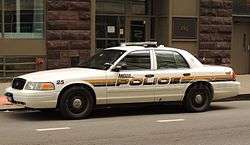Metra Police Department
| Metra Police Department | |
|---|---|
|
Patch of the Metra Police Department | |
| Agency overview | |
| Legal personality | Governmental: Government agency |
| Jurisdictional structure | |
| Operations jurisdiction* | State of Illinois, United States |
| General nature |
|
| Operational structure | |
| Headquarters | Chicago, Illinois |
| Sworn members | 77 |
| Agency executive | Joseph M. Perez, Chief |
| Website | |
| metrarail.com | |
| Footnotes | |
| * Divisional agency: Division of the country, over which the agency has usual operational jurisdiction. | |
The Metra Police Department was created to protect Metra's 11 rail lines and 241 stations in Northeastern Illinois.[1] The primary function of the Metra Police Department is to protect Metra passengers, employees, assets (trains and stations), enforce criminal laws, traffic laws and ordinances that directly or indirectly relate to the Metra system. Metra police officers are fully sworn officers just like the officers of any municipal police department, responsible for the safety and security of the Metra system in a six-county service area – Cook, Will, DuPage, Kane, McHenry and Lake counties.
History
In 1974 the Illinois State Legislature created the Regional Transportation Authority. When the RTA reorganized in 1983, Metra was created. This act empowers all the sub units of the RTA to establish and maintain police forces. The Metra Police Department was created at that time. The RTA Act states that these police departments have the authority of municipal police officers. Metra Police Officers routinely and regularly enforce all Criminal law violations of the state of Illinois. Metra Police Officers are authorized to enforce all of the traffic laws of the Illinois Vehicle Code. The main focus of Metra Police law enforcement is the six county transit operation, however due to the great distances between rail lines, off property arrests occur on a regular basis. All Metra Police Officers are fully certified Police Officers and many are former State, City, County, and Suburban police officers. The Metra Police Department requires that a candidate possess several years experiences in State, City, County, or Suburban police work. Because of the six counties of police operation, tickets and criminal complaints are booked into many different courts. As a general rule, court cases will be assigned in the nearest court, in the county of arrest.
Safety is an important part of this function, and preventing accidents and injuries are a focus of the department. Many times enforcing traffic laws around Metra stations and crossings is intended to increase awareness and citizen compliance. Metra Police work in cooperation with local authorities to reduce or attempt to prevent hazardous conditions or blatant violations of the law which result in an unsafe condition. Metra Police routinely assist local, county and state agencies in non Metra related matters. The jurisdiction of the Metra Police extends well past the property owned or leased by Metra. Metra Police may make arrests anywhere in the State of Illinois including outside their jurisdiction, just as any police officer in the state of Illinois can make an arrest or write a ticket outside of their jurisdiction.

In 2008, the department began using a computer aided dispatch system and new electronic report writing system.
In January 2014, an investigative report by the Chicago-based security consulting firm Hillard Heintze blasted the department as being “antiquated”[2] and beset with excessive overtime and staffing problems. The 114-page report sketched an alarming portrait of law enforcement standards on the Metra system.[3] It detailed myriad concerns about the agency's training, counter terrorism efforts and commitment to passenger safety. According to the report, the department averages less than one arrest per day.
In May 2014, Joseph Perez was appointed to Chief of the Metra Police Department.[4] Perez was selected from a field of 12 candidates after 68 applied for the job.
Homeland Security Unit
After the September 11 attacks in 2001, the Metra Police Department increased its effort in anti-terrorism concerns. The Homeland Security Unit (formally Special Operations Unit) concentrate on protecting passengers and Metra terminals in the downtown Chicago area, and throughout the entire system. Officers have been assigned to the Chicago Police Fusion Center (CPIC), and the Illinois State Police Statewide Terrorism Information Center (STIC). Metra Police officers regularly participate in the Chicago Police CAPS program. Metra Police regularly participate in Chicago Office of Emergency Communications (OEMC) planning meetings for large events.
Fallen officers
Since the establishment of the Metra Police Department, one officer has died in the line of duty. On September 27, 2006 Metra Officer Thomas A. Cook was killed in the line of duty[5] while working a robbery prevention detail near the 147th Street/Sibley Metra Station in Harvey, Illinois.
See also
References
- ↑ "Metra Police Department". Retrieved 23 February 2015.
- ↑ "New report finds Metra police force 'antiquated'". ABC7 Chicago (WLS-TV). January 22, 2014. Retrieved 23 February 2015.
- ↑ St. Clair, Stacy (January 23, 2014). "Report calls Metra police force 'antiquated,'". Chicago Tribune. Retrieved 23 February 2015.
- ↑ Wronski, Richard (May 12, 2014). "Metra names new police chief". Chicago Tribune. Retrieved 23 February 2015.
- ↑ "Police Officer Thomas Alan Cook". The Officer Down Memorial Page. Retrieved 23 February 2015.
